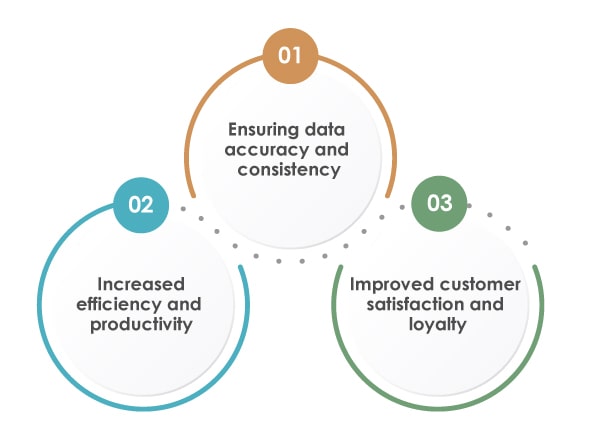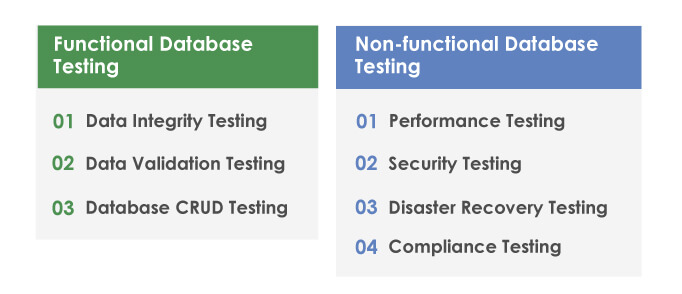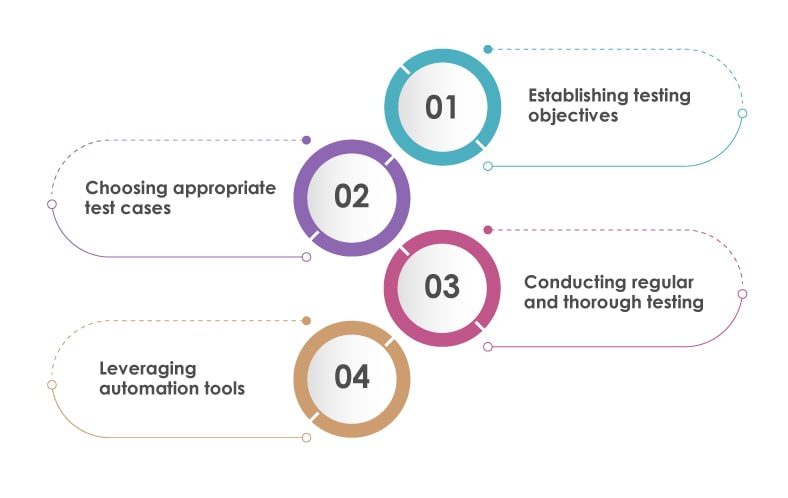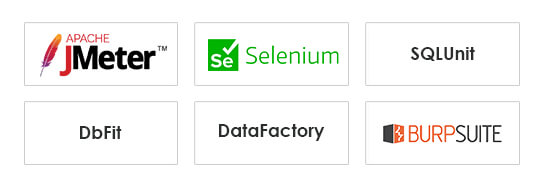Recommended Blogs
Database Testing: Key to Driving Successful Business Decisions

Table of Contents:
1. The State of Database Testing in 2023
2. Why Do Businesses Need Database Testing?
3. Why Conduct Robust Database Testing?
4. Benefits of Performing Database Testing
5. Types of Database Testing
6. Non-functional Database Testing
7. Best Practices for Conducting Database Testing
8. Tools for Robust Database Testing
9. Conclusion
10. How can TestingXperts help with the Database Testing?
The State of Database Testing in 2023
In today’s data-driven world, businesses rely heavily on the accuracy and consistency of their data to make informed decisions and stay ahead of the competition. However, with the increasing volume and complexity of data, ensuring consistency in data has become a daunting task for businesses. Inaccurate or inconsistent data can have major consequences for businesses, including poor decision-making, increased costs, decreased customer satisfaction, and reputational damage. That’s why businesses need to prioritize robust database testing to mitigate these risks and ensure the success of their business.
Robust database testing can help businesses mitigate these risks associated with data by ensuring data accuracy and consistency, identifying and fixing errors before they cause problems, and providing confidence in the quality of data.
Why Do Businesses Need Database Testing?
Robust database testing helps ensure the quality, accuracy, and consistency of data stored in databases. It involves testing the data for errors, inconsistencies, and omissions and verifying that it meets the required standards and specifications. Its importance cannot be overstated in today’s data-driven business environment. Businesses rely heavily on the accuracy and consistency of their data to make informed decisions and drive growth and database testing is essential to ensure that data is reliable and accurate.
Without proper database testing, businesses run the risk of making decisions based on inaccurate or inconsistent data, which can lead to poor business outcomes. For example, an e-commerce company that has inaccurate data about its inventory levels may end up overselling products and leaving customers dissatisfied. Similarly, a financial institution with inconsistent customer credit history data may approve loans to unqualified borrowers, leading to potential losses.
Why Conduct Robust Database Testing?
One of the main negative impacts of not testing databases is the risk of making decisions based on inaccurate or inconsistent data. This can lead to poor business outcomes such as decreased customer satisfaction, reputational damage, and lost revenue. For example, a healthcare provider that uses inaccurate patient data may provide the wrong treatment, resulting in adverse patient outcomes. Similarly, a retailer that relies on inconsistent sales data may stock the wrong products, leading to lower sales and customer dissatisfaction.
Another negative impact of not testing databases is the increased risk of security breaches. Inadequate testing of database security can leave sensitive information vulnerable to unauthorized access and data breaches. This can lead to significant financial losses and reputational damage for businesses.
Finally, not testing databases can lead to inefficiencies and increased costs for businesses. Inaccurate or inconsistent data can result in unnecessary rework and increased operational costs. For example, a logistics company that uses inaccurate shipment data may have to reroute shipments, resulting in increased transportation costs and decreased operational efficiency.
Benefits of Performing Database Testing

Conducting robust database testing is not only necessary to mitigate risks but also has several benefits for businesses:
Ensuring data accuracy and consistency:
By testing databases thoroughly, businesses can ensure that the data they rely on for decision-making is accurate and consistent. This, in turn, leads to more reliable business outcomes and helps businesses make informed decisions.
Increased efficiency and productivity:
By identifying and fixing issues in the database, businesses can improve the performance of their applications, leading to faster processing times, reduced downtime, and increased productivity. For example, a financial institution that conducts regular database testing may identify and fix issues that cause delays in transaction processing, leading to faster transactions and improved customer satisfaction.
Improved customer satisfaction and loyalty:
By ensuring data accuracy and consistency, businesses can provide better customer service, which leads to increased customer satisfaction and loyalty. For example, an e-commerce company that uses accurate customer data can provide personalized recommendations, resulting in a better customer experience and increased customer loyalty.
Types of Database Testing

When it comes to database testing, it can be classified into two broad categories: functional testing and non-functional testing. Let’s explore the different types of database testing within each category:
Functional Database Testing:
Data Integrity Testing:
This type of testing ensures that the data stored in the database maintains its accuracy, consistency, and integrity. It involves validating constraints, relationships, and data types to identify any inconsistencies or corruption.
Data Validation Testing:
Data validation testing focuses on verifying whether the data entered into the database conforms to the specified criteria. It includes checking data types, formats, and business rules to ensure that only valid and expected data is accepted.
Database CRUD Testing:
CRUD stands for Create, Read, Update, and Delete operations. This type of testing ensures that these basic database operations are working correctly. It involves validating the ability to create new records, retrieve existing data, update records, and delete data from the database.
Non-functional Database Testing:
Performance Testing:
Performance testing evaluates the speed, scalability, and stability of the database under different workload conditions. It measures factors such as response times, throughput, and resource utilization to identify performance bottlenecks and optimize the database for efficient execution.
Security Testing:
Security testing focuses on identifying vulnerabilities and ensuring the confidentiality, integrity, and availability of the database. It involves testing access controls, authentication mechanisms, data encryption, and protection against SQL injection and other potential security breaches.
Scalability Testing:
Scalability testing assesses the database’s ability to handle increasing data volumes, user loads, and transaction rates. It aims to determine if the database can scale up or down as required without compromising its performance or stability.
Disaster Recovery Testing:
Disaster recovery testing verifies the effectiveness of backup and recovery mechanisms in the event of a system failure or data loss. It ensures that the database can be restored to a consistent state and that data integrity is maintained during the recovery process.
Compliance Testing:
Compliance testing ensures that the database complies with relevant industry standards, regulations, and data privacy laws. It includes testing features such as audit trails, data masking, and data anonymization to ensure data protection and regulatory compliance.
Best Practices for Conducting Database Testing

To ensure the effectiveness of robust database testing, it is important to follow best practices that maximize efficiency and accuracy.
Establishing testing objectives:
Before conducting database testing, it is crucial to establish clear testing objectives. It involves defining what aspects of the database you want to test, what specific goals you want to achieve through testing, and what outcomes you expect. By setting clear objectives, you can focus your testing efforts and ensure that the testing process aligns with your business requirements.
Choosing appropriate test cases:
Selecting appropriate test cases is essential for comprehensive database testing. Test cases should cover different scenarios like normal operations, boundary conditions, and potential error situations. By choosing diverse and relevant test cases, you can identify potential issues and ensure that the database performs optimally in various scenarios.
Conducting regular and thorough testing:
Regular and thorough testing is essential to maintain the quality and reliability of the database. Testing should not be a one-time activity but an ongoing process throughout the database lifecycle. Regular testing helps identify issues early on, allowing for timely resolutions and preventing the accumulation of critical errors. Thorough testing involves testing different aspects, including data integrity, performance, security, and compatibility, to ensure the overall robustness of the database.
Leveraging automation tools:
Automation tools can significantly enhance the efficiency and accuracy of database testing. These tools automate repetitive tasks, such as test case execution, data generation, and result verification, saving time and reducing human error. Automation also allows for the execution of a large number of test cases, enabling more extensive testing coverage. By leveraging automation tools, businesses can streamline their testing processes and improve the overall effectiveness of database testing.
Tools for Robust Database Testing

When it comes to conducting robust database testing, there are several tools available that can streamline the testing process and enhance efficiency. These tools provide functionalities for various aspects of database testing, including data verification, performance monitoring, security assessment, and more.
Apache JMeter:
It is a widely used open-source tool for performance testing. It allows testers to simulate heavy loads on databases and measure their performance under different scenarios. With its user-friendly interface and powerful features, Apache JMeter is an excellent choice for assessing the scalability and responsiveness of databases.
Selenium:
It is a popular automation testing framework that supports web application testing, including database testing. It enables testers to automate the execution of test cases and interact with web-based database applications. Selenium’s robust functionality and compatibility make it a valuable tool for conducting end-to-end testing, including database interactions.
SQLUnit:
It is a framework specifically designed for unit testing databases. It provides a set of tools and APIs to write and execute SQL-based unit tests. SQLUnit helps validate the correctness of database operations and ensures the integrity of the data. It is an effective tool for developers and testers who want to perform comprehensive unit testing of database systems.
DbFit:
It is an open-source tool that supports agile database testing. It allows testers to write tests in a tabular format using simple wiki syntax. DbFit integrates with popular database systems and provides features like data-driven testing, test data generation, and data verification. It is particularly useful for teams following agile methodologies and practicing continuous integration.
DataFactory:
It is a data generation tool that enables testers to create realistic and diverse test data for database testing. It offers a wide range of data generation options, including structured and unstructured data, random data, and data patterns. With DataFactory, testers can ensure that the database performs well with different types of data and handle complex data scenarios effectively.
Burp Suite:
It is a comprehensive web application testing tool that includes features for database security testing. It allows testers to identify vulnerabilities and security flaws in the database layer. Burp Suite’s advanced scanning capabilities, including SQL injection detection, make it an invaluable tool for assessing the security of database-driven applications.
Conclusion
In the rapidly evolving technological landscape, where businesses are highly dependent on databases to store, manage, and analyze critical data, ensuring the quality and reliability of databases is paramount for business success. Beyond traditional quality assurance, robust database testing plays a pivotal role in validating the accuracy, integrity, performance, and security of databases.
By implementing various types of functional and non-functional database testing, organizations can identify and address potential issues early on, minimizing the risk of data corruption, security breaches, and performance bottlenecks.
A well-tested and optimized database not only enhances the overall software system’s efficiency but also instills confidence in stakeholders and customers. Embracing comprehensive database testing practices is an investment in the long-term stability, scalability, and success of a business in today’s data-driven world.
How can TestingXperts help with Database Testing?
TestingXperts believes that databases are the backbone of digital businesses, holding valuable information that drives business decisions. Without proper testing, this sensitive data might be susceptible to errors, inconsistencies, or even corruption. These issues can lead to costly consequences, including operational disruptions, compromised customer trust, and financial losses.
We specialize in helping businesses ensure that their databases are running smoothly and accurately. Our team of experts has years of experience in the industry and provides top-notch services to our clients.
TestingXperts Differentiators
Expertise:
Our team of experienced database testers possesses in-depth knowledge of various database management systems and testing methodologies. We have worked with a wide range of clients across different industries, enabling us to understand the unique challenges you may face in your specific domain.
Comprehensive Testing Approach:
We adopt a comprehensive approach to database testing, covering all aspects including data integrity, performance, scalability, and security. Our thorough testing process ensures that your database functions flawlessly under various scenarios, providing you with the confidence to handle large data volumes and increasing user demands.
Cutting-Edge Tools and Technologies:
We leverage the latest tools and technologies in the field of database testing to deliver exceptional results. Our experts are well-versed in using industry-standard tools that help us identify bottlenecks, optimize queries, and enhance the overall performance of your database.
Customized Solutions:
We understand that every business has unique requirements when it comes to their databases. That’s why we offer customized testing solutions tailored to your specific needs. Whether you have a small-scale database or a complex enterprise-level system, we can design a testing strategy that fits your budget and timeline.
Risk Mitigation:
Data breaches and security vulnerabilities can have severe consequences for your business. Our database testing services focus not only on functional aspects but also on identifying and mitigating potential security risks. We perform rigorous security testing to ensure that your data remains confidential and protected from unauthorized access.
Transparent Reporting:
We believe in clear and transparent communication with our clients. Throughout the testing process, we provide detailed reports and insights, allowing you to track the progress and understand the outcomes of our testing efforts.
Discover more
